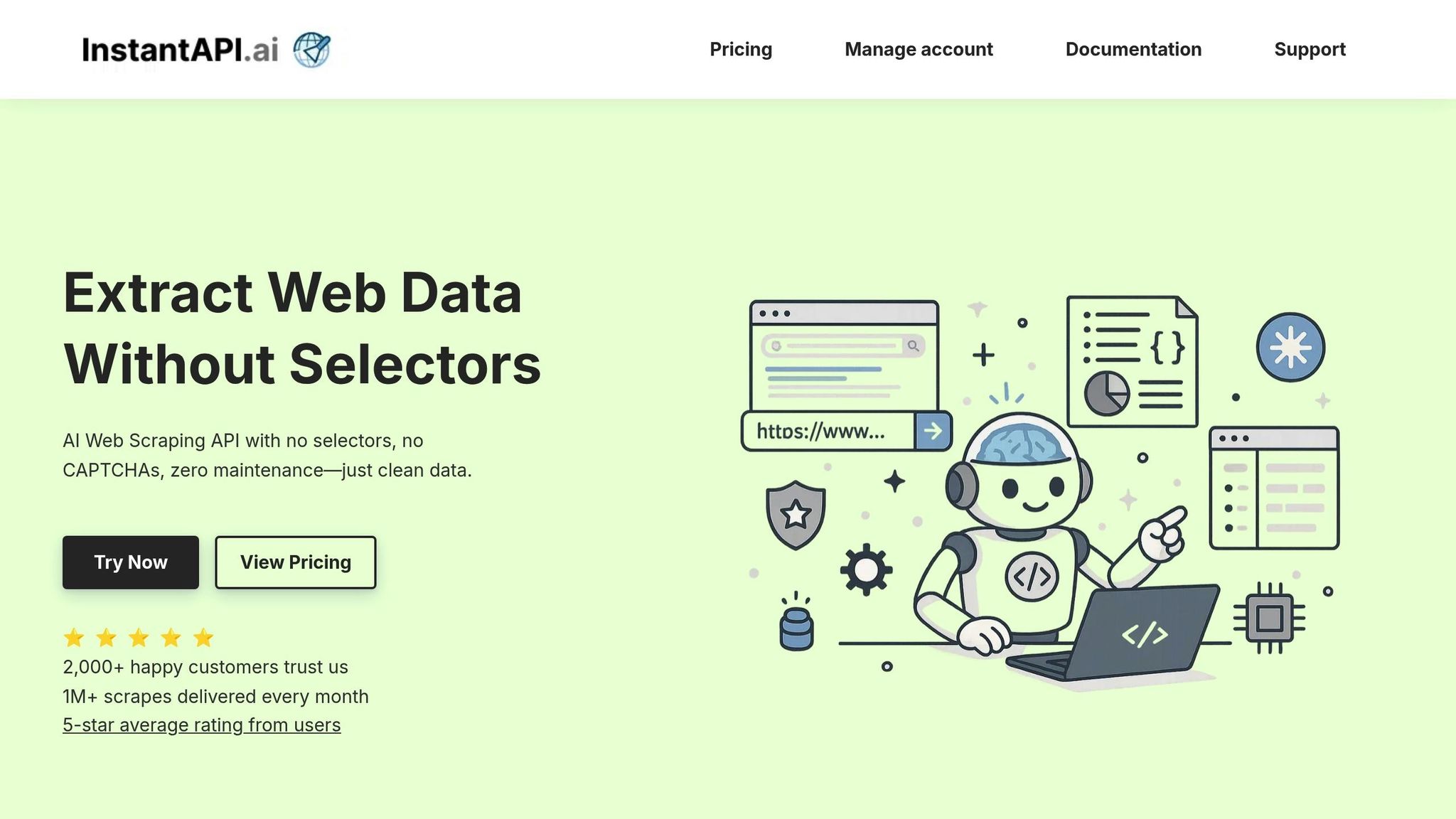Web scraping is transforming the automotive repair industry by automating the collection of critical data like competitor pricing, customer reviews, and service trends. Repair shops can now make smarter decisions by analyzing real-time insights, improving their services, and staying competitive in a crowded market.
Key takeaways:
- Service Trends: Real-time data helps shops identify popular services, seasonal demand, and regional preferences.
- Competitor Analysis: Scraping tools track pricing, promotions, and service offerings from competitors.
- Customer Sentiment: Reviews and feedback reveal what customers value and where improvements are needed.
- AI Tools: Advanced scraping tools like InstantAPI.ai simplify data extraction, handle website changes, and bypass anti-scraping measures.
With over 15,000 online sources to monitor, automated tools are essential for turning raw data into actionable insights. This shift is helping repair shops refine pricing, optimize inventory, and improve customer satisfaction.
Data Sources for Automotive Service Analysis
When it comes to navigating the fragmented world of automotive repair data, effective web scraping is a game-changer. The automotive repair industry spans over 15,000 online sources - from dealership and OEM websites to classifieds and review platforms - all offering valuable market insights for repair shops. To make sense of this vast landscape, precise data extraction is key to turning raw information into actionable strategies.
Main Data Sources
Here are some of the top sources that provide valuable insights for the automotive repair sector:
- Repair shop websites: These are goldmines for competitive information, offering details on service menus, pricing, promotions, certifications, and customer testimonials.
- Customer review platforms: Platforms like Yelp, Google Reviews, and Edmunds contain raw customer feedback on everything from service quality to pricing and turnaround times. This feedback can highlight shifts in customer preferences and market share.
- Automotive forums and community sites: Spaces like Reddit's automotive subreddits offer real-time discussions on repair experiences, vehicle issues, and recommendations. These forums often reveal trends before they hit the mainstream, thanks to car enthusiasts sharing their firsthand insights.
- Parts retailer websites and inventory listings: These sites provide a clear picture of which parts are in high demand, pricing trends, and regional availability. Such data is crucial for inventory planning and shaping service offerings.
- Manufacturer and dealership service departments: By publishing warranty details, recall notices, and authorized repair procedures, these sources give repair shops a peek into emerging service opportunities and shifts in market trends.
Data Types to Extract
To make informed decisions, repair shops need to focus on extracting specific data points that directly influence their operations. Here's a breakdown of the most useful data categories:
- Service pricing: Information on labor rates, flat fees, package deals, and seasonal promotions helps shops benchmark their pricing against competitors.
- Customer sentiment data: Ratings, detailed reviews, common complaints, and specific praises provide a window into what customers value most and where competitors may be lacking.
- Service frequency patterns: Insights into the most requested repairs, seasonal demand shifts, and emerging maintenance needs are invaluable for inventory and staff planning.
- Regional service variations: Pricing differences, service availability, and customer preferences across different areas offer opportunities to tailor services to local markets.
- Vehicle-specific repair data: Data on issues by make and model, warranty repairs, and parts replacement trends allow repair shops to specialize in high-demand services and prepare for future needs.
- Contact information and business details: Details like shop locations, hours, service specializations, and promotional campaigns provide competitive intelligence for market positioning and potential expansion.
Organizing and analyzing this data efficiently is no small task. With thousands of sources, each with unique formats, manual collection is simply not practical - it’s time-consuming and quickly outdated. Automated tools for data extraction are essential for staying competitive in the fast-moving automotive repair market.
Web Scraping Applications in Automotive Repair
Web scraping has become a game-changer for automotive repair shops, helping them streamline pricing strategies, refine services, and strengthen their position in the market. By pulling data from various sources, repair shops can make smarter decisions that boost profits and improve customer satisfaction.
Tracking Competitor Pricing and Services
Keeping an eye on competitor pricing is crucial in the automotive repair industry. Web scraping allows repair shops to gather up-to-date information on competitors' service prices, promotions, and offerings directly from their websites.
This data helps identify pricing gaps and service opportunities. For instance, if competitors in the area offer similar services at lower prices, shops can quickly spot and address these discrepancies. Additionally, tracking promotional campaigns reveals when competitors roll out seasonal discounts or introduce new services, giving shops the chance to respond strategically.
By combining this pricing and service data with customer sentiment analysis, repair shops can stay ahead of market trends and better meet customer expectations.
Customer Review and Sentiment Analysis
Customer reviews are a goldmine of insights for improving operations. Web scraping tools can collect reviews from platforms like Google, Yelp, and automotive forums, while sentiment analysis interprets the tone of customer feedback to uncover key patterns.
For example, research shows that 61% of consumers read fewer than 10 reviews before forming an opinion about a business. Additionally, 80% of reviews mention staff, with 70% of these mentions being positive. However, poor communication is a recurring issue, appearing in 37% of negative reviews.
According to Gartner, by 2026, 80% of customer-facing businesses will use sentiment analysis tools, which can lead to a 15–20% boost in customer retention rates. One case study even demonstrated a 45% reduction in response times and a 20% improvement in customer satisfaction.
"The Sentiment Analysis feature has significantly improved our ability to address negative interactions promptly, leading to a more positive dealership user experience." - Prominent Automotive Client
For repair shops, sentiment analysis highlights areas needing attention, such as long wait times or unclear estimates, while also identifying strengths like standout technicians or highly rated services. These insights can guide both operational improvements and marketing strategies, ensuring shops address customer needs effectively.
Regional and Seasonal Trend Detection
Web scraping also helps repair shops identify regional and seasonal trends by analyzing data from repair requests, parts sales, and online discussions.
Regional trends often reflect local driving habits and vehicle preferences. For example, data from parts retailers and forums can reveal demand shifts tied to specific weather conditions or terrain, allowing shops to prepare in advance. Seasonal trends are equally important - services like A/C repairs spike in summer, while heating system and winter tire checks dominate colder months.
Tracking parts sales data is another valuable application. By monitoring prices and sales volumes of car parts, repair shops can spot lucrative opportunities and adjust their inventory and pricing strategies to align with local demand. For instance, observing secondhand part pricing or identifying popular items in certain regions can help shops fine-tune their offerings.
This comprehensive approach ensures automotive repair businesses stay competitive by aligning their services with market trends and customer needs.
Web Scraping Challenges in Automotive Data
Extracting data from automotive repair websites isn't as straightforward as it might seem. From technical roadblocks to compliance concerns, these challenges can disrupt even the most carefully planned scraping projects. For repair shops aiming to gather market insights and stay competitive, tackling these hurdles is essential.
Technical Problems
One of the biggest challenges is dynamic content generation. Many automotive repair websites and forums use JavaScript and AJAX to load key information like pricing, services, and reviews. Traditional scrapers that only process static HTML often miss this dynamically generated content, leaving gaps in the data.
Another issue is website structure changes and selector drift. Repair shops frequently update their websites, tweaking pricing pages or service listings. These changes can break scrapers that rely on specific HTML elements, forcing constant updates to the extraction logic.
Then there’s the problem of anti-scraping defenses. Many websites deploy advanced measures such as CAPTCHAs, IP blocking, honeypot traps, and rate limiting. Some even use browser fingerprinting to analyze visitor behavior, making it tough for automated tools to mimic legitimate users.
Finally, inconsistent data formats across different websites make it harder to analyze the information. Whether it’s varying ways of listing prices, reviews, or service categories, the lack of a uniform structure complicates the process.
All of these challenges demand flexible and reliable solutions to ensure data accuracy and continuity.
Solutions for Reliable Data Extraction
Here are some strategies to tackle these technical hurdles and keep data extraction on track:
- Schema-based extraction: Instead of relying on specific HTML elements, schema-based systems focus on the semantic meaning of the data. This approach makes it easier to adapt when websites change their layouts.
- Headless browser integration: Tools that mimic real browsers can render JavaScript and process AJAX calls, ensuring dynamically loaded content - like pricing tables or service details - is captured accurately.
- Automatic proxy rotation and CAPTCHA handling: By rotating IP addresses and using automated CAPTCHA-solving tools, scrapers can bypass anti-scraping defenses while respecting rate limits.
- Continuous monitoring and adaptation: Automated systems can detect when a scraper fails due to website changes and alert operators. Some platforms even adjust selectors automatically to minimize downtime.
- Ethical scraping practices: Respecting robots.txt files, adding delays between requests, and avoiding server overload are essential for maintaining compliance and reducing the risk of being blocked.
- Data standardization pipelines: To address inconsistencies, these pipelines normalize extracted data, converting prices into standard formats, unifying review ratings, and mapping service categories to a common structure. This ensures data from various sources can be analyzed cohesively.
sbb-itb-f2fbbd7
How InstantAPI.ai Simplifies Automotive Web Scraping

Repair shops face a constant battle with evolving site structures, strict anti-scraping measures, and the need to keep their tools updated. To tackle these challenges, many are turning to InstantAPI.ai. This platform streamlines the process of extracting data, saving time and effort by automating tasks and delivering structured JSON files ready for integration. In an industry where websites frequently change and defenses are tough, InstantAPI.ai stands out with its schema-based extraction, proxy management, and flexible pricing. Let’s break down how these features make automotive web scraping easier.
Schema-Based Data Extraction
Schema-based data extraction focuses on the meaning of the data rather than the HTML structure of a website. Why is this important? Because traditional scrapers often break when a website updates its layout - something that happens frequently in the automotive sector.
With InstantAPI.ai, you simply define the data you need in JSON format - whether it’s service prices, customer reviews, or repair shop locations - and the platform takes care of the rest. No need to write or adjust CSS selectors or XPath expressions that may become outdated overnight.
For example, if you’re tracking oil change prices across multiple locations or monitoring customer ratings for repair services, the system keeps working even if the sites redesign their pages. The result? Clean, structured JSON files that can be fed directly into your business intelligence tools or databases, skipping the tedious steps of cleaning and normalizing data.
Automatic Proxy and CAPTCHA Management
One of the toughest parts of web scraping is dealing with sites that actively block bots. InstantAPI.ai tackles this head-on with advanced proxy rotation and CAPTCHA-solving capabilities.
The platform uses a network of millions of rotating IPs worldwide to ensure uninterrupted access. When sites deploy CAPTCHAs or enforce rate limits, InstantAPI.ai mimics human browsing behaviors and solves CAPTCHAs automatically. It even switches between premium residential and stealth proxies depending on the website’s defenses. This system achieves an impressive 99.99%+ success rate, making it a reliable tool for collecting data on service trends across different regions.
Usage-Based Pricing
InstantAPI.ai offers a straightforward pay-per-use pricing model - $2 per 1,000 web pages scraped. This flexible approach is perfect for repair shops, allowing them to scale up during busy seasons for competitor analysis without overspending during slower periods. There are no hidden fees or surprise charges; you only pay for what you scrape.
With over 1 million pages scraped each month and more than 2,000 satisfied customers, InstantAPI.ai’s pricing model supports businesses of all sizes, helping them stay competitive in the ever-changing automotive market.
Data-Driven Insights for Automotive Repair
Data is reshaping how automotive repair shops operate and compete. The industry now has access to an immense pool of information - spanning over 15,000 dealership sites, OEM platforms, classifieds, and review websites. By leveraging AI-driven web scraping tools, repair shops can tap into this data to uncover insights that drive smarter strategies and better decision-making.
With InstantAPI.ai's powerful data extraction, repair shops gain real-time market intelligence that helps them stay ahead. Shops can monitor competitor services, track trending repairs, and spot emerging customer needs before they become widespread. This kind of foresight allows businesses to adapt quickly to market changes and position themselves strategically.
The impact of AI solutions in this space is impressive. Many companies report an 18% boost in customer satisfaction and employee productivity after adopting AI-driven tools. Even more striking, every dollar invested in AI is generating an average return of $3.50 - a 350% ROI. Beyond operational improvements, analyzing customer sentiment also plays a key role in refining service offerings.
"AI systems are helping to optimize the supply chain to ensure the availability of critical parts at the right time while minimizing unnecessary inventory and handling product quality issues. AI is helping by predicting demand, optimizing inventory, and managing logistics." - Ron Schmelzer, Contributor, Forbes
Understanding Customer Sentiment
Traditional surveys often miss the nuances of customer experiences. By analyzing reviews, forum discussions, and social media mentions, repair shops can uncover unfiltered insights into what customers value - and what frustrates them. This data highlights service gaps and reveals opportunities to stand out from competitors.
Predictive Maintenance and Proactive Services
AI also enables predictive maintenance by analyzing patterns from multiple data sources. Historical repair data, seasonal trends, and regional driving conditions can help predict when specific vehicle components are likely to fail. Armed with this information, repair shops can optimize inventory, reduce wait times, and offer proactive maintenance services that customers appreciate.
Smarter Supply Chain Management
Supply chain optimization is another game-changer. With real-time data from InstantAPI.ai, shops can track inventory levels, supplier pricing, and shipping times across multiple vendors. This allows them to adjust sourcing strategies based on price changes, availability, and delivery schedules - cutting costs and speeding up service.
Adapting to Regional Trends
Real-time data scraping also helps shops stay in tune with local needs. By continuously analyzing regional trends, businesses can adjust staffing, training, and inventory to match evolving demand patterns. This localized approach ensures repair shops remain relevant and responsive to their communities.
The potential of AI-driven web scraping is reflected in its projected growth. The market is expected to surge from $7.48 billion in 2025 to $38.44 billion by 2034, with a compound annual growth rate of 19.93%. This rapid expansion underscores the growing recognition of automated data collection as a strategic necessity across industries.
With InstantAPI.ai managing the complexities of data extraction, repair shops can focus on turning insights into action. The platform delivers clean, structured JSON data that integrates seamlessly with existing business intelligence tools, eliminating the hassle of data cleaning and formatting.
"Web scraping is more than just a technical tool - it's a strategic asset that empowers businesses to make informed decisions, identify trends and maintain a competitive edge." - Jacob (Yakup) Kalvo, CEO of Live Proxies
FAQs
How can web scraping help automotive repair shops set competitive prices and attract more customers?
Web scraping enables automotive repair shops to collect up-to-date information on competitor pricing, customer feedback, and service offerings from websites, forums, and other online platforms. By examining this data, shops can fine-tune their pricing strategies to align with market trends and customer preferences, helping them maintain a competitive edge.
It also reveals competitors’ promotional tactics and uncovers service gaps, offering insights that can be used to refine pricing, boost profit margins, and draw in more customers. This data-driven strategy keeps repair shops ahead in the ever-changing U.S. automotive repair industry.
What are the biggest challenges in web scraping for the automotive repair industry, and how can they be addressed?
Challenges of Web Scraping in Automotive Repair
Web scraping in the automotive repair industry isn't without its hurdles. Common issues include anti-scraping measures like CAPTCHAs, IP bans, and websites with dynamically loaded content. These barriers can make it tricky to gather consistent data from sources such as repair shop websites, online forums, and customer review platforms.
To tackle these obstacles, businesses can use techniques like rotating proxies and user-agent spoofing to disguise scraping activities, along with web automation tools that mimic real browsing behavior. Frequent updates to website structures and rate limits also require solutions like scalable infrastructure, robust error handling, and continuous monitoring to maintain data accuracy and efficiency.
By integrating AI-powered tools and strategies designed specifically for this sector, automotive repair businesses can simplify their data collection efforts and stay ahead in analyzing service trends.
How can analyzing customer reviews help automotive repair shops improve their services?
Analyzing customer reviews gives automotive repair shops a clearer picture of how well they’re meeting customer expectations and highlights areas that need attention. Through sentiment analysis, shops can identify recurring themes in positive feedback - like outstanding customer service or fast repairs - and double down on what’s working. On the flip side, negative reviews can uncover specific pain points, such as pricing issues, miscommunication, or inconsistent service quality.
By leveraging this information, repair shops can tackle problem areas, improve the overall customer experience, and strengthen their reputation. Taking action based on these insights doesn’t just resolve issues - it can also boost customer loyalty and drive business growth.


